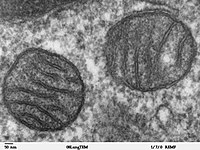
Photo from wikipedia
Alzheimer's disease, one of the most common neurodegenerative diseases, is pathologically characterized by Amyloid beta containing plaques and neurofibrillary tangles. Amyloid beta (Aβ) induces neuronal apoptosis through the intracellular Ca2+… Click to show full abstract
Alzheimer's disease, one of the most common neurodegenerative diseases, is pathologically characterized by Amyloid beta containing plaques and neurofibrillary tangles. Amyloid beta (Aβ) induces neuronal apoptosis through the intracellular Ca2+ increase, subsequent hyperactivation of cyclin‐dependent kinase 5 (Cdk5) and mitochondrial abnormality. Recently, Cdk5 was identified as an upstream regulator of mitochondrial fission during neuronal apoptosis, but the underlying mechanism remains unclear. Here, in vitro phosphorylation assays showed that Cdk5 could phosphorylate the recombinant Drp1 at Serine 579. Aβ1‐42 stimulation increased the phosphorylation level of Drp1 at Serine 579 in mouse cortical neurons. Cdk5 inhibitor roscovitine and knockdown of Cdk5 by a lentiviral vector expressing shRNA targeting Cdk5 (Lenti‐Cdk5‐shRNA) efficiently prevented Aβ1‐42 induced Drp1 phosphorylation in neurons. In addition, Aβ1‐42 stimulation induced markedly mitochondrial fission in neurons. Roscovitine, Lenti‐Cdk5‐shRNA and expression of phospho‐defect mutatant GFP‐Drp1‐S579A in neurons attenuated Aβ1‐42 induced mitochondrial fission, whereas expression of phospho‐mimetic mutant GFP‐Drp1‐S579D alone resulted in mitochondiral fission similar to Aβ1‐42 stimulation. Moreover, Roscovitine and Lenti‐Cdk5‐shRNA suppressed the cleavage of caspase‐3 and protected neurons against Aβ1‐42 induced neuronal apoptosis.Thus, our data indicate that Drp1 is a direct target of Cdk5, and Cdk5‐mediated phosphorylation of Drp1 at Serine 579 regulates Aβ1‐42 induced mitochondrial fission and neuronal toxicity.
Journal Title: Journal of Cellular Biochemistry
Year Published: 2018
Link to full text (if available)
Share on Social Media: Sign Up to like & get
recommendations!